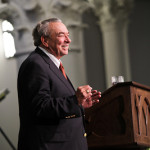 Classically the Trinity was defined in these terms:
Classically the Trinity was defined in these terms:
God is one in essence
and three in person.
I wish I had a dollar for every time I’ve heard or seen this formulation described as a “contradiction.” Why is it called a contradiction? We are accustomed to thinking in terms of “One person equals one essence.” This equation may be a convenient one, but it’s not a rationally necessary one. The Trinity is indeed unusual and mysterious, we would be engaging in the nonsense of contradiction. Something cannot be one in A and three in A at the same time and in the same relationship. That’s contradiction.
The classical formula of the Trinity is that God is one in one thing (one in A, essence) and three in a different thing (three in B, persona). The church fathers were careful not to formulate the nature of God in contradictory terms. The distinction among persons of the Godhead may be “essential” to Christianity, but the distinction itself is not an essential distinction about God. That is, though the distinction among persons is a real and necessary distinction, it is not an essential distinction.
Lest we seem to be guilty of equivocation here, let me explain further. When I say that the personal distinction among the Godhead is not an essential distinction, I mean by “essential” that which refers to being or essence, not to that which is “important” or “necessary” for other reasons. The distinction is “essential” in the sense that it is important and necessary for our understanding. It is not “essential” in the sense that it distinguishes being or essence in God.
The formula is not meant to say that essence and person are the same things. Essence refers to the being of God, while person is used here as substance within being. Essence is primary and persona is secondary. Essence is the similarity, while personal is the dissimilarity in the nature of God. He is unified in one essence, but diversified in three personae.
This excerpt is taken from Not a Chance by R.C. Sproul.
